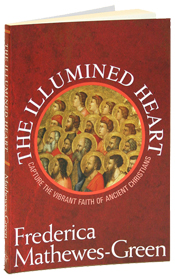
Frederica Matthewes-Green’s new book, “The Illumined Heart: Capture the Vibrant Faith of Ancient Christians” is a very short exposition on the faith of early Christians and what we as “modern” Christians can learn from them. Frederica Matthewes-Green converted to Orthodoxy a few years ago, and that is important to know in reading her understanding of spirituality and how we should live out our Christian lives today.
Matthewes-Green says that early Christians’ desire was solely to “live in Christ” and that is far from where modern Christians are today. In the short book, she shares some snippets from a fictional early Christian family’s life and how they would have gone about living in Christ and seeking after a deep connection and transformation from Christ. I struggled to really get into that storyline in the book, so that really didn’t do anything for me.
It seems that Matthewes-Green has a problem with the laxity of Christians today and she discusses how her early Christian fictional character Anna fought against that temptation at all times:
“There is no need for shame. Nor is there reason to slack off. Anna must take seriously Jesus’ charge to ‘be perfect,’ and daily ask for grace to perceive her sins and fight against them. Otherwise she will block the love that God constantly streams toward her, and her healing will be delayed.” ((Frederica Matthewes-Green, “The Illumined Heart” (Brewster, MA: Paraclete Press, 2007), 11.))
She is also very insistent that we have gone a long ways off from the theology and spirituality of the early Christians – and that, in her mind, has moved us further from the heart of Christianity. She says that we need to believe that which was written by the early Christians – probably more so than any new writings today. She writes:
“There’s a further reason to listen to these early Christians: What they believed was held consistently, over a very long time and over very long distances. That’s a supernatural feat on the order of a miracle. We modern Christians have come to expect that theology, morality, and worship will shift dramatically over the course of a decade or two, and between one neighboring congregation and another. We’re not even ashamed of this any more, or concerned about how truth could be so splintered.” ((Ibid., 14))
Knowing that she has found the Orthodox Church as her community of faith helps to explain why she believes these things. I was good friends with an Antiochian Orthodox Priest in Idaho and he and I had many conversations about theology, Emergent and alt.worship practices. While he was interested, he wasn’t about to change anything in his worship service, or deviate from the theology and faith of the early church fathers and mothers. So I understand that. I just happen to disagree with it. Matthewes-Green quotes fifth-century monk St. Vincent of Lérins’ test for finding true faith from falsehood: “that which has been believed everywhere, always, and by all.” But what if that which has been believed everywhere, always and by all is just wrong. There is always that possibility.
Again, in speaking of our current desire to reformulate theology and be open to new ways of thinking, Matthewes-Green disagrees:
“The current age will always blow with confusing winds, and they are never authoritative. No innovator can be smart enough to reinterpret Scripture or to cook up new theology all by himself…No, it was in returning to the common faith that they would once again hear the Holy Spirit’s voice. Think again about those leaders, those early bishops and teachers, and how they were like museum guards…” ((Ibid., 18))
Her ideal for teachers and leaders of today is that they would serve as museum guards of the faith. Again, it makes sense from her perspective, but not the type of faith I resonate with.
She goes on in her book to talk about some spiritual disciplines (almsgiving, praying without ceasing, the Jesus Prayer) that one should try to live out in order to be fully connected and transformed by God. She tried to cover a lot in a few pages, and it ended up not being very engaging or interesting, unfortunately. But if you want to give this book a try, I’ll ship it off to the person who leaves the first comment and asks for the book.